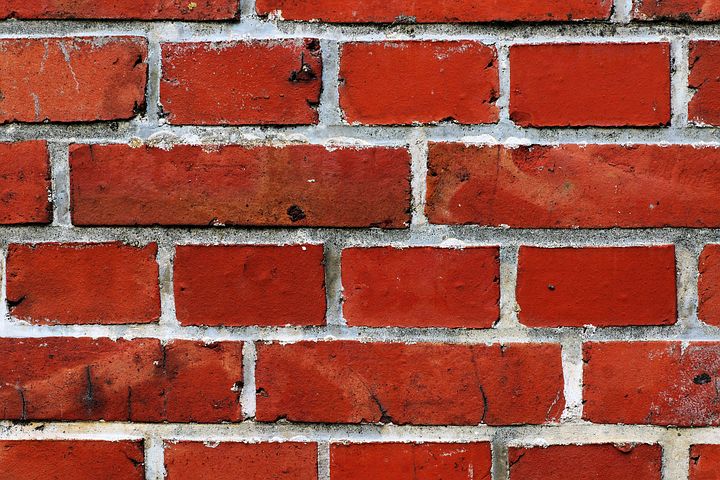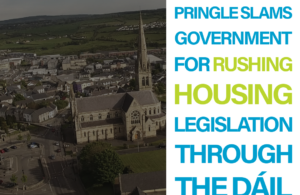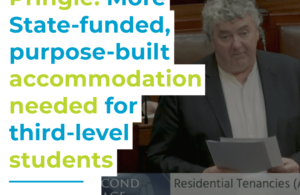- Pringle: We need a policy that recognises the importance of inshore fishing
- Pringle: Disabled people and carers face crisis of State neglect
- Pringle: Failed FF/FG housing policies forcing people to put their lives on hold
- Pringle welcomes Donegal council motion on Occupied Territories Bill: ‘We cannot stand by in the face of genocide’
Support housing policies built around people, not the private sector
- Updated: 4th February 2020

‘We need homes for people, not houses for profit,’ Thomas Pringle says
Independent candidate Thomas Pringle said Fine Gael’s housing policies are built around the private sector, rather than the thousands of people in Donegal and across the country who are in need of housing.
“We need homes for people, not houses for profit,” he said. “Fine Gael’s Rebuilding Ireland programme invites further privatisation of housing provision rather than delivering the homes that our people need in the numbers that they need them.”
He said the government must reduce its reliance on the private sector for the provision of public housing and return increased funding to local authorities for the work.
Pringle said: “Last October, the number of people homeless in Ireland reached 10,500 for the first time. Affordable public housing is crucial in meeting the needs of our society, but Fine Gael, in a government propped up by Fianna Fáil, have failed to deliver that.”
Pringle said: “In my manifesto, ‘For Donegal. For the People’, I call for increased funding for local authorities to empower them to build social housing and for a credible strategy that reduces reliance on the private sector to provide housing.”
He said there was a 44 per cent rise in the number of people in homelessness in the North West region between June 2016 and September 2019, including many who are “hidden homeless” – people living in inadequate or emergency accommodation, facing eviction or unable to pay rent.
“We also have to address the needs of people in need of housing as a matter of urgency, and I would also push for the replacement of one-night emergency accommodation with more stable placements that take into account the needs of families in homelessness,” he said.
Pringle continued: “Fine Gael’s housing policies are built around the private sector. You can also see that in the Housing Assistance Payment (HAP) scheme. It is estimated that one-fifth of the 2020 housing budget, about €500 million, will be channeled towards private landlords.
“And caps on HAP were last set in 2016, despite rents continuing to increase around the country. About half of HAP recipients pay top-ups to their landlords because the payment does not cover their rent. This is not a programme that puts the needs of people, and their right to housing, first.”
While he cautiously welcomed the government scheme to address homes affected by mica – a problem Donegal homeowners have lived with for seven years – Pringle said it still does not go far enough.
“Donegal homeowners must still pay 10 per cent of the costs of mica problems that were not of their making, after seeing their homes degrade, plummet in value and become uninsurable. The government must provide 100 per cent grants for mica-affected homeowners, in line with the scheme rolled out in North Leinster.”
He welcomed funding for flood defenses made available for a number of communities, but noted that significant numbers of people in Donegal and other parts of the country remain vulnerable to flood and storm damage.
“We need comprehensive flood relief schemes to cover all areas of Donegal affected by increasing floods and storm damage, to ensure timely and sufficient grant aid,” he said.
Pringle concluded: “These issues stem from a government policy that has failed to recognise the right of people to safe and affordable housing. We must ensure the rights of the people remain at the forefront of housing and all government policies.”



